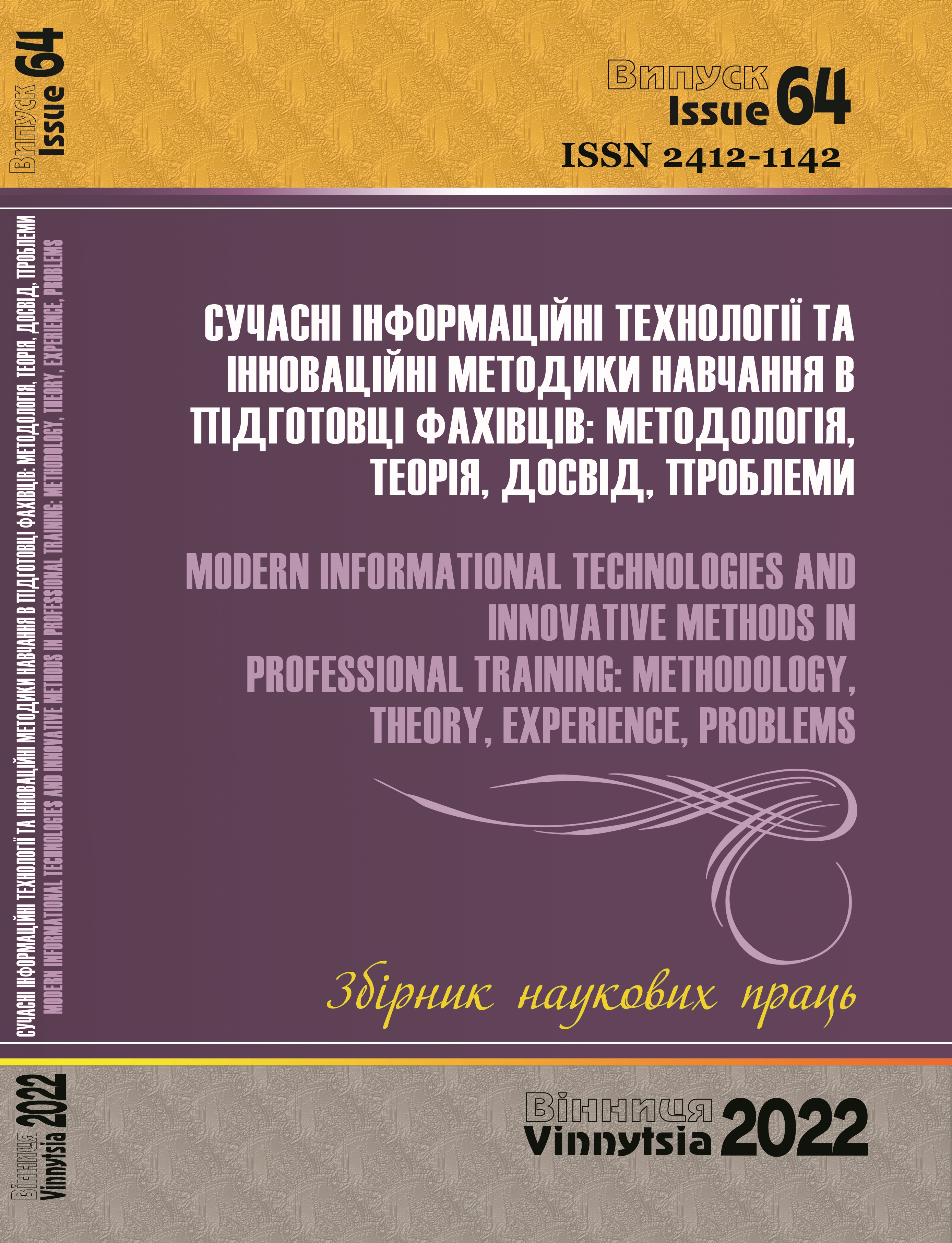ОСОБЛИВОСТІ ПРОЦЕСУ ФОРМУВАННЯ ІНФОРМАТИЧНОЇ КОМПЕТЕНТНОСТІ МАЙБУТНІХ ПЕДАГОГІВ ПРОФЕСІЙНОГО НАВЧАННЯ
DOI:
https://doi.org/10.31652/2412-1142-2022-64-23-31Keywords:
professional training, professional competences, informative competence, labour functions, quality of educational processAbstract
At time of digital society the problem of the concept ‘informative competence’ is of great
importance. It can be raised in both the sphere of everyday life of modern man and the field of would-be
specialists’ professional training. In the area of the latter the informative competence formation of wouldbe professional education teachers is to be significantly concerned, thus the specific tasks to be
accomplished by them are connected with the use of modern technologies and information processing.
The purpose of the article deals with defining of number of specific features of informative competence
formation of would-be professional education teachers while realizing professional and educational
program 015 Professional Education. That may promote the optimizing of the appropriate educational
process.
I order to describe the state and level of the studied problem development, conclusions and
recommendations formation the method of analysis and synthesis was used.
The work outlines the basic concept of informative competence on the basis of the study results of native
and foreign scientists. Thus, informative competence is described as integrative dynamic personal
characteristic. It includes complex of valuative and motivated orientations and reflexive activity,
mastering the skills to work with information (analysis, transformation, search and others) and
information technologies, as well as special knowledge and abilities that are necessary for substantial and
justified choice, their optimal use while solving professional and educational studying tasks at the time of
total digitalization and demands of digital society.
Having analyzed the standard ‘Teacher of professional education’ and the standard of higher education of
Ukraine, of the first Bachelor level, of the specialty 015 Professional Education, a number of specific
features of informative competence formation of would-be professional education teachers is presented.
That is proved by determining of the content of educational components in the field of the following
professional education teacher’s labour functions: planning educational process, producing educational
process, performing self-studying activity, producing methodological work, accomplishing research and
experimental work, performing monitoring of educational activity, holding professionally oriented work.
Downloads
References
Головань М.С. Інформатична компетентність. Проблеми інженерно-педагогічної освіти: Збірник
наукових праць. 2007. No 16. C. 314–324
Спірін О.М. Інформаційно-комунікаційні та інформатичні компетентності як компоненти системи
професійно-спеціалізованих компетентностей вчителя інформатики. Інформаційні технології і засоби
навчання. 2009. No5. URL: http:// https://journal.iitta.gov.ua/index.php/itlt/article/download/183/169
(дата звернення: 16.02.2022).
Петухова Л.Є. Інформатичні компетентності майбутнього вчителя початкових класів (в моделі
трисуб'єктної дидактики): навч.-метод. посіб. Херсонський державний університет. Херсон. 2010. 524 с
Король О. М. Формування інформатичної компетентності майбутніх бакалаврів освіти на засадах
диференційованого підходу: автореф. дис. ... канд. пед. наук : спец. 13.00.04. Суми, 2019. 20 с.
Хуторской А. В. Ключевые компетенции. Технология конструирования. Народное образование. 2003.
No5. С.55-61
Нітченко Г. М. Зміст і методика підготовки майбутніх учителів трудового навчання з інформатики :
автореф. дис. ... канд. пед. наук : спец. 13.00.02. Чернігів, 2008. 22 с.
Петренко, С. І., Петренко Л. В. Модель формування інформатичної компетентності майбутніх учителів
інформатики в процесі фахової підготовки. Педагогічні науки: теорія, історія, інноваційні технології :
н. – Суми : СумДПУ ім. А. С. Макаренка, 2020. No 2 (96). С. 154–164.
Жукова В. М. Сутність і структура інформатичної компетентності майбутнього вчителя математики.
Вісн. Луган. нац. пед. ун-ту імені Тараса Шевченка : Педагогічні науки. 2006. No 21(116). С. 119 – 128.
Imran, A.S., Pireva, K., Dalipi, F., Kastrati, Z. An analysis of social collab-oration and networking tools in e-
learning. In: Zaphiris P., Ioannou A. (eds) Learning and Collaboration Technologies. LCT 2016. Lecture Notes DOI: https://doi.org/10.1007/978-3-319-39483-1
in Computer Science. S. 332–343.9Жукова В. М. Сутність і структура інформатичної компетентності
майбутнього вчителя математики. Вісн. Луган. нац. пед. ун-ту імені Тараса Шевченка: Педагогічні
науки. 2006. No 21(116). С. 119 – 128.
Lervik M., Haave H., Vold T., Ranglund O.J., Holen S. Blended learning: How to combine different ways to
interact online. Paper presented at the Proceedings of the European Conference on e-Learning, ECEL. 2017.
S. 298–303.
Lock, J., Johnson C. From assumptions to practice: Creating and supporting robust online collaborative learning.
International Journal on E-Learning: Corporate, Government, Healthcare, and Higher Education. No16(1). 2017.
S. 47–66.
Clark, R.C. E-Learning and the Science of Instruction: Proven Guidelines for Consumers and Designers of
Multimedia Learning. May-er. – 3rd ed., 2016. 502 s.
Barakhsanova, E.A., Golikov A.I., Sorochinsky M., Nikitina E., Lukina T. Implementation of the Master
Program “Corporate E-Learning” in the Online Interaction of Russian Universities. Revista ESPACIOS. 2018.
Vol. 39 (# 20). S 36.
Стандарт вищої освіти України перший (бакалаврський) рівень, галузь знань 01 – «Освіта / Педагогіка»,
спеціальність 015 – «Професійна освіта (за спеціалізаціями)». Затверджено і введено в дію наказом
Міністерства освіти і науки України від 21.11.2019 р. No 1460.
Професійний стандарт «Педагог професійного навчання». Затверджено і введено в дію наказом
Міністерства розвитку економіки, торгівлі та сільського господарства України від 20.06.2020 р. No 1182.
Mohammad, N.M. The study of the teacher's role and student interaction in elearning process. 4th International
Conference on e-Learning and e-Teaching (ICELET). 2013. S. 114 – 121
Pathak, B.K. Emerging online educational models and the transformation of traditional universities. Electronic
Markets. No26. 2016. S. 315 – 321. DOI: https://doi.org/10.1007/s12525-016-0223-4
Downloads
Published
Issue
Section
License
Copyright (c) 2022 Дмитро Кільдеров, Андрій Гедзик

This work is licensed under a Creative Commons Attribution 4.0 International License.





